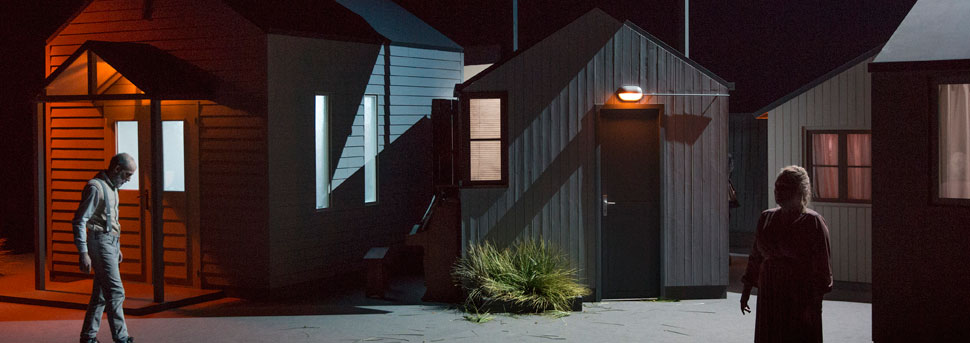with Vincent Cahay, Anne-Pascale Clairembourg, Epona et Séléné Guillaume, Pierre Kissling, Vincent Lécuyer, Bernard Marbaix, Catherine Mestoussis, Jean-Benoit Ugeux, Anne-Cécile Vandalem, Françoise Vanhecke
concept, writing and direction Anne-Cécile Vandalem
music composed and performed by Vincent Cahay, Pierre Kissling
scenography Ruimtevaarders
sound designer Jean-Pierre Urbano
light designer Enrico Bagnoli
video designer Federico d’Ambrosio and Arié van Egmond
costume designer Laurence Hermant
make-up designer Sophie Carlier
assistant director Sarah Seignobosc
stage manager Damien Arrii
production Das Fräulein (Kompanie)
coproduction Théâtre de Liège, Le Volcan – Scène Nationale du Havre, Théâtre National – Bruxelles, Théâtre de Namur, centre dramatique, Le Manège.Mons, Bonlieu Scène nationale Annecy, Maison de la Culture d’Amiens – Centre européen de création et de production, Les théâtres de Marseille – Aix en Provence
coproduction in the context of Prospero Project Théâtre National de Bretagne, Théâtre de Liège, Schaubühne am Lehniner Platz, Göteborgs Stadsteatern, Théâtre National de Croatie / World Theatre Festival Zagreb, Festival d’Athènes et d’Epidaure, Emilia Romagna Teatro Fondazione
with the help of Fédération Wallonie-Bruxelles, Service Théâtre
and with the support of ESACT, l’Ecole Supérieure d’Acteurs / LA HALTE, Liège de Liège
Running time 2h 15′
National première
With Italian and English subtitles
Far right parties are on the rise throughout Europe. In the countries of Northern Europe, National Awakening—an antidemocratic, populist movement led by Martha Heiger. In Martha’s birthplace, a suicide has taken place. Leader’s visit to the peninsula for her funeral is announced. Ellen, a young teenager, sets out to assassinate the woman threatening her and her country’s future. But on the day of the funeral, the situation drastically changes…
Tristesses is a theatrical performance whose main theme is the relation between power and sadness. Borrowing the conventions of detective fiction and political comedy, Anne-Cécile Vandalem explores with humor one of the most formidable political weapons of the day: making the masses sad. Through cinematographic stage design, she shines a spotlight on the power of the media and the ways censorship functions in the open or, insidiously, in the shadow.
Statement of intent
by Anne-Cécile Vandalem
Fighting against what drives us to despair daily, in this world.
I want to talk about sadness. I want to talk about how our bodies are disempowered daily, by the influence that other bodies — persons, things, or situations — exert on ours.
I want to talk about the tyranny of positivity: today, in Western societies, we only exist in the light of what we do. Like a theater spotlight, this positivity projects a permanent, blinding, and paralyzing glow; it overexposes the spectacle of our actions. What place is there in such a landscape for shade, sparkle (the movement back and forth between shadow and light), resistance, desire?
I want to talk about the relationship between sadness and power, because it is obvious that nowadays the greatest political weapon is to make people sad, and guilt, shame, frustration, powerlessness, hatred and despair are its byproducts.
I want to talk about emotions as motions and transformative force; when they are converted into thoughts and actions, emotions can become engines and live energy, momentum that initiate speech or action. Thus, an individual complaint can announce a collective filing of grievances. Therefore, through emotions we may also be able to transform our world.
I want to show tears as the manifestation of external signs of sadness, because they have infinite aesthetic power. I want to talk about adolescence as a vital force, power for the future; about the paradoxical unfolding of teenage bodies, in which desires are born as hopes collapse.
Finally I want to talk about the “Survival of the Fireflies” (1), about what falls and declines and yet, in the process, emits a meteoritic light apt to inform those who will come afterward about their past and help guide their future. I want to talk about any image that guarantees the transmission of experience, and in doing so guarantees the survival of “peoples destined to disappear.”
(1) G. Didi-Huberman, “Survivance des lucioles”, ed Minuit, 2009.
Anne-Cécile Vandalem. Biography
Anne-Cécile Vandalem
Anne-Cécile Vandalem (b. 1979) began as an actress, working with directors and theatre collectives such as Charlie Degotte, Dominique Roodthooft, and Transquinquennal. She has also appeared in films directed by, amongst others, Anne Leclercq, Frédéric Forestier, Xavier Serron, Frédéric Fonteyne, Dominique Standaert and Karine Devillers. In 2003, she decided to embark upon the writing and conceiving of theatre shows, and together with Jean-Benoît Ugeux created Zaï Zaï Zaï Zaï and Hansel and Gretel. In 2008 she created Das Fräulein (Kompanie) within which she will develop her work: (Self) Service, Habit(U)ation (Kunstenfestivaldesarts 2011), After the walls (Utopia) (Kunstenfestivaldesart 2013) extracted from the Trilogie des parenthèses, and Michel Dupont, réinventer le contraire du monde.
In 2014, Anne-Cécile Vandalem leads off exploring the modalities of posture and imposture. She questions the subject/individual’s capacity for action and transformation of reality within different societal spheres, and addresses the issue of disclosure and fragility as honest posture and / or strategic one in her writing. Her creations What can I do for you?, Still too sad to tell you, Tristesses testify in their own way these new aesthetic concerns.


